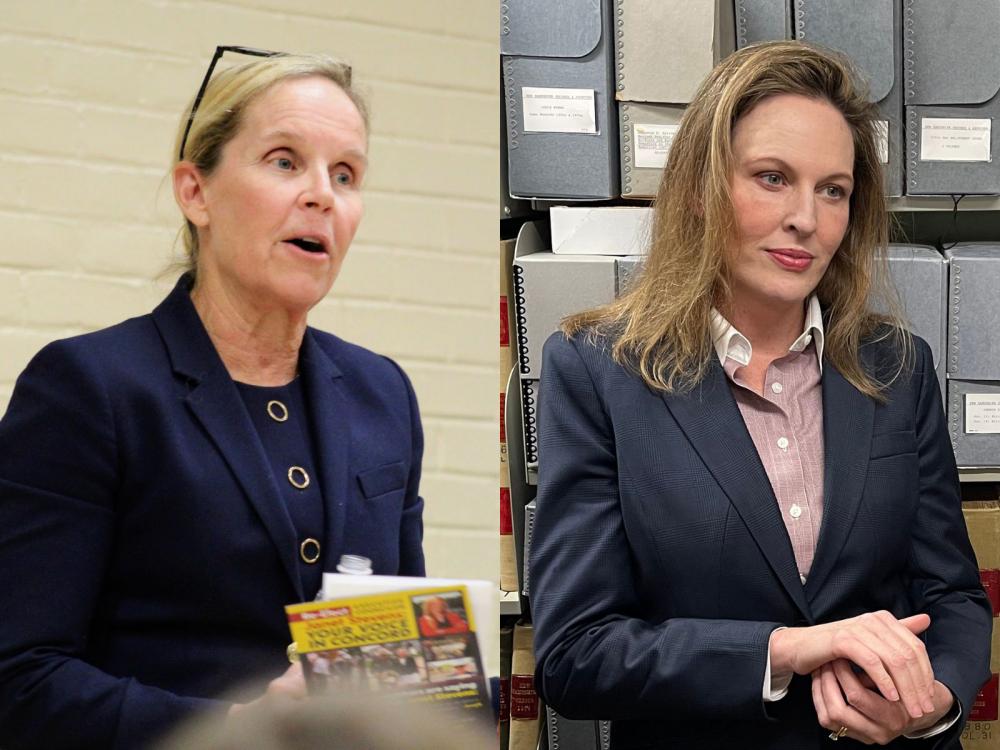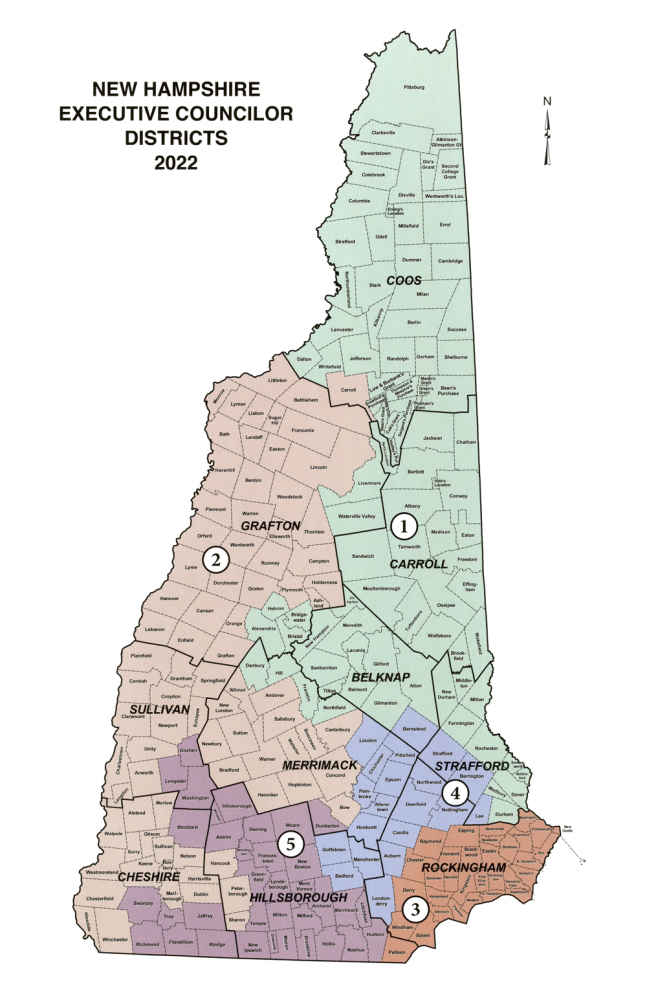CONCORD — Katherine Harake drove to the NH state archives from her home in Hampton on a recent Thursday afternoon, her sights set on one particular document penned 342 years ago.
With help from the state records manager, Harake inspected the document’s uneven edges, remarked on its penmanship and marveled at such a significant, if lesser-known, piece of the state’s political history.
The document, issued by King Charles II in 1680, established the Executive Council to counterbalance the officeholder then known as New Hampshire’s “president” but now known as “governor.” The five-member council was written into the state constitution a century later. To this day, the governor-council arrangement remains a unique form of state government.
 An archival document from 1680 shows that King Charles II established the Executive Council to counterbalance the officeholder then known as NH’s “president” but now known as “governor.” The five-member council was written into the state constitution a century later. (Steven Porter/Granite State News Collaborative)
An archival document from 1680 shows that King Charles II established the Executive Council to counterbalance the officeholder then known as NH’s “president” but now known as “governor.” The five-member council was written into the state constitution a century later. (Steven Porter/Granite State News Collaborative)
Now Harake, a Democrat, is hoping to win a seat on the council. She’s challenging Republican incumbent Councilor Janet Stevens of Rye in the Nov. 8 election to represent District 3, which covers the bulk of Rockingham County plus Pelham.
Republicans currently outnumber Democrats 4-1 on the council, and after this year’s GOP-led redistricting process, all five incumbents are favored to win reelection, meaning Republicans are likely to hang onto their majority.
Despite their long odds, Democrats have mustered a field of candidates to contest all five races and make their case that the GOP councilors are out of touch with Granite Staters.
Democrats Point to Republicans Rejecting Health-care Funds for Low-Income Women
Harake, who describes herself as a moderate, accused Stevens of making decisions to advance her own political views rather than listening to her constituents.
“We don’t have a king anymore, so instead of following the king’s orders, we’re supposed to follow the people’s orders,” Harake says.
In an interview, Harake cites two decisions as particularly galling. First, the Republicans on the council last year declined $27 million in federal funds intended for COVID-19 vaccine outreach. Second, the Republicans in July declined to fund contracts for family planning providers that serve low-income Granite Staters — it was their fourth time rejecting the contracts.
“These are not fiscally responsible decisions,” Harake says. “The council’s job is to be fiscally responsible, and denying health care — especially denying care to lower-income populations — is not fiscally responsible.”
“If you want to say ‘no’ to something, you can always come up with a reason,” she adds. “It’s up to the public whether or not they believe that reason was legitimate.”

Republican incumbent Councilor Janet Stevens of Rye (left) and Democratic challenger Katherine Harake of Hampton are competing in the Nov. 8, 2022 election for the District 3 seat on the NH Executive Council. (Steven Porter/Granite State News Collaborative)
Stevens declined a phone interview request but responded to questions via email.
The “initial hesitancy” about approving the $27 million in federal COVID-19 vaccine funds was based on concern that the funds could come with onerous federal requirements, Stevens says. So a resolution was drafted with the attorney general to make sure there weren’t any burdensome strings attached, then Stevens says she voted in support of the funds thefollowingmonth.
About the family planning contracts, Stevens says the issue boils down to a matter of compliance with state law, which includes required financial audits to confirm that no state funds will be used to subsidize abortions. (An audit last year confirmed that none of the state funds sent to Planned Parenthood subsidized abortion. In addition, Republican Gov. Chris Sununu urged the Republican councilors at each vote to approve the funds, assuring them none of the money is used to fund abortions. The money is for health screenings for women with low incomes.)
“On several occasions, the family planning contracts on the executive council agenda lacked critical information or appropriate time to analyze the data,” Stevens says.
When she spoke about the family planning contracts at a candidate forum in Salem this month, Stevens similarly cited delays and compliance issues as the basis for her opposition, adding that she would welcome the opportunity to review them again with those wrinkles ironed out.
Harake says Stevens is citing procedural technicalities but voting based on her own views on abortion.
“I have respect for people who don’t believe in everything we believe in,” Harake says. “But at least say it when you’re going to make a decision.”
Speaking at a Stratham GOP fundraiser this month, Stevens said her challenger “just doesn’t get it.”
Stevens says she works late to help solve constituents’ problems and review contract language with painstaking detail. She likens the council’s fiduciary responsibility to that of a board of directors, and she says Harake doesn’t realize how much the job entails.
“She has no idea how hard I work for all of you,” Stevens says.
The council reviews all state contracts of $10,000 or greater; approves the appointments of judges, commissioners and other officials nominated by the governor; and hears requests for pardons, among other duties.
Democrats Face an Uphill Battle
Andrew Smith, director of the UNH Survey Center, says the newly redrawn maps mean the Executive Council has three districts that are solidly Republican, one district that leans Republican, and one district that is solidly Democratic.
“They’ve done their best to pack as many Democrats as they can into that one single district,” he says.
Smith says the one Republican-leaning district on the map is District 3, where Stevens is defending her seat. “There is potential for Democrats to take that in a big Democratic year,” he said. But historical patterns suggest this year isn’t likely to be a big Democratic year, he adds.
Voters for the president’s party tend to show up in lower numbers for midterm elections, especially when the president’s approval rating is low, Smith says. What’s more, very few NH voters know who their executive councilor is or what the council does.
"So when people vote for an executive councilor, they’re typically voting for the R or the D, not for the specific candidate," he says.
It’s not uncommon for voters to leave the Executive Council line on their ballot blank. In 2020, more than 814,000 ballots were cast overall, but only about 760,000 votes were recorded for the Executive Council races, according to records published by the NH secretary of state's office.
Gerrymandering Claims Hit Political Wall in NH
A group of Democrats filed a lawsuit alleging partisan gerrymandering in the 2022 redistricting process, but a judge dismissed the lawsuit this month, concluding that it presents a purely political question the courts must not answer.
Elliot Gault, executive director of the NH Republican Party, said the GOP expects to hold onto its 4-1 majority on the council, with all incumbents getting reelected. But he dismissed the notion that this year’s redistricting process pointed to a foregone conclusion.
“At the end of the day, it’s good candidates and hard work that will decide these elections,” he says.

The five newly redrawn Executive Council districts include three solidly Republican districts, one district that leans Republican and one district that’s solidly Democratic, according to Andrew Smith, director of the UNH Survey Center. (Provided/NH Secretary of State’s Office)
After all, the Democrats accused Republicans of gerrymandering the Executive Council districts in 2012, then Democrats went on to win a 3-2 majority on the council in 2018 using those same maps, Gault says.
Smith notes that the 2018 midterms brought historic successes for Democratic candidates nationwide in the wake of President Donald Trump’s 2016 victory. The turnout this year isn’t likely to set a midterm high mark, he says.
Cinde Warmington of Concord, currently the only Democrat on the Executive Council, says it’s clear that past gerrymandering is the reason why Republicans currently hold 80% of the council’s seats.
“The state is not an 80/20 state, so right now the composition of the council does not reflect the values of the state,” she says.
Lone Democrat on Council Has Been Building
Warmington says she has for the past two years been building infrastructure to shift the council’s balance and better reflect the electorate.
“When I took office, one of the first things that I started working on was making sure that the public became more aware of what the Executive Council does and how important it is,” she says. “And I think that effort has people focused on this race and also helped us to recruit really great candidates in every district.”
Warmington represents District 2, which currently stretches from the Vermont border to the Maine border with a thin strip across the middle of the state. The newly redrawn boundaries mean Warmington is running for reelection in a District 2 that’s concentrated farther west. The new district covers the bulk of Grafton, Sullivan, Cheshire and Merrimack counties, including Concord. (Most of the Strafford County communities that had been in District 2, including Durham, Dover and Rochester, will move to District 1.)
Republican challenger Harold F. French of Canterbury, who’s wrapping up a third term in the NH Senate, aims to unseat Warmington. Despite his district being a tougher environment for a GOP candidate, he says his odds still look fairly good, if Republicans successfully drive voter turnout.
“My polls show I’m up by 8% right now, but I only poll my family members,” he quipps.
Cornerstone Backs All But One GOP Candidate
Of the five Republican candidates running for Executive Council this cycle, French is the only one who didn’t receive an endorsement from the conservative Christian advocacy group Cornerstone, which has urged councilors to reject even more family planning contracts.
Cornerstone Executive Director Shannon McGinley said French didn’t get an endorsement because he voted against an amendment that would have given health providers the option to induce delivery rather than perform an abortion in the event of a diagnosed fatal fetal abnormality. French and three fellow Republicans joined all 10 Democrats in the Senate to reject the amendment.
French shruggs off the non-endorsement: “I like what Cornerstone does. I value their opinion,” he says. “But I don’t ever take their opinion and make it my mantra.”
If elected, French says he would have a tough time voting in favor of any state contract for Planned Parenthood because he believes the organization isn’t open to accepting what he views as reasonable restrictions on abortion. He says he would consider proposals from other family planning service providers on a case-by-case basis.
French says he’s a proponent of charter schools and policies that support school choice, including the state’s Education Freedom Accounts.
Warmington says the outcome of the Nov. 8 election will determine who handles the “critically important” issues that will come before council in the next two years.
Dispute Over After-School Sex Ed Program
Cornerstone has also urged councilors to reject an after-school sex ed program. McGinley says that’s because the group doesn’t want tax money spent "to promote pornography addiction and promulgate gender ideology.”
In an email about the curriculum, Cornerstone claimed Planned Parenthood “wants to sexualize your child.” Four days later, Cornerstone issued a correction admitting they were wrong to claim money was going to Planned Parenthood to implement the program.
Warmington says she reached out to state health officials to try to understand what Cornerstone means by its “wants to sexualize” claim.
“There is no basis for that statement other than just to forward their own private agenda that is not backed up by any evidence-based data,” she says.
Warmington says this is an after-school program that requires parental consent to opt-in, and the contracts wouldn’t be awarded to Planned Parenthood. What’s more, the program has been shown to effectively reduce teen pregnancy rates and delay sexual activity, she says.
This is one area where Stevens disagrees with her fellow Republicans. In a procedural vote, she sided with Warmington in an unsuccessful effort to move forward with discussion of the sex ed contracts. Her three GOP colleagues kept the matter tabled, even though they had approved such contracts in past years.
Stevens says she voted with Warmington because councilors can talk through their concerns: “Discourse is essential to understanding the nuances of contracts coming before the Executive Council.”
Who is Running for Executive Council in NH in 2022?
The Democrats and Republicans who won their primaries for the five Executive Council districts are as follows:
In District 1, Republican incumbent Joseph D. Kenney of Wakefield faces Democratic challenger Dana S. Hilliard of Somersworth, the city's mayor.
In District 2, Democratic incumbent Cinde Warmington of Concord faces Republican challenger Harold F. French of Canterbury.
In District 3, Republican incumbent Janet Stevens of Rye faces Democratic challenger Katherine Harake of Hampton.
In District 4, Republican incumbent Ted Gatsas of Manchester faces Democrat challenger Kevin J. Cavanaugh of Manchester.
In District 5, Republican incumbent Dave Wheeler of Milford faces Democrat challenger Shoshanna Kelly of Nashua.
Steven Porter is the founding editor of Granite Memo.
This article is being shared by The Granite State News Collaborative, as part of its race and equity initiative. It was edited by Seacoast Media, a partner in the collaborative. For more information visit collaborativenh.org.

 Current Issue - April 2024
Current Issue - April 2024